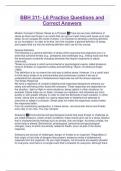BBH 311- L6 Practice Questions and
Correct Answers
Modern Concept of Stress: Stress as a Process ✅There are as many definitions of
stress as there are things in our world that can get our heart racing and cause us to lose
sleep. As we navigate the world of stress, it is important to develop a working definition
as our foundation. In order to do that, let's first consider a general definition of stress,
and expand that out into the working definition we'll use for this course.
General Definition
The following is a general definition of stress which assumes that organisms live in a
world that contains threats (e.g., predators) and challenges (e.g., finding food) and that
the world poses constantly changing demands that require organisms to adjust
continually.
"Stress is a process in which environmental or psychological events, called stressors,
come to threaten an organism's safety and well-being." Baum, Grunberg & Singer
(1982)
This definition is by no means the only way to define stress. However, it is a useful start
to think about stress in its environmental and evolutionary context if we are to
understand the cascade of biobehavioral responses we call the stress response.
The Stress Response
We have a repertoire of complex biobehavioral responses designed to enhance our
safety and well-being when faced with stressors. These responses are dependent on
the situation...fight-or-flight in some situations, being vigilant in other situations, for
example. Stress helps us run faster, increase our vigilance, and otherwise act more
quickly or with greater efficacy in order to meet the demands of each situation. In other
words, stress acts to amplify our coping responses or biobehavioral attempts to
overcome or adapt to a stressor. Stress does not make the responses, stress makes
the responses better.
From an evolutionary perspective, it makes sense - we encounter harms and threats
every day in our lives. You may recogniz
Stressors ✅Environmental and psychological events that pose threats or challenge us
are called stressors. Under certain conditions, these events give rise to a stress reaction
that is characterized by feelings such as anxiety, fear and anger. As stress unfolds, the
entire body is altered. Biochemical, physiological, behavioral and psychological
changes, many of which are directly related to health, occur as part of the stress
response.
Stressors are sources of challenges, danger or threats to an organism. Regardless of
their origin or the kinds of dangers they present, stressors evoke a biobehavioral
response from the organism. As you might imagine, not all events are equally stressful
for everyone, and there is no single event that is stressful for everyone, although there
, probably are exceptions with the most extreme types of stressors - ones that involve the
potential loss of life, limb or property. In those extreme circumstances, we would expect
responses to the stressor to be more consistent across individuals. In general, the less
severe the threat or weaker the stressor, the more variation we see in how people
respond to the stressor or whether they view it as a stressor at all.
Overall, stressors vary in many ways, including:
Type of stressor
Duration of the stressor
Frequency of occurrence
Take a moment to reflect on two things that have happened in the last week that you
would label "stressful." As you reflect on these events, make a list for each related to
the dimensions of stress listed above. As you compare and contrast the two events,
think about: How are they similar? How do they differ? (E.g., perhaps your two stressors
differed by type and duration.)
Let's consider each of these areas more closely.
Type of Stressors
Below are six types of stressors. In addition to the examples provided, see if you can
think of
Dimensions of Stressors ✅We've already seen some ways in which stressors can
vary. More specifically, Lazarus & Cohen (1977) have identified three general
dimensions of stressors. These are:
Duration of the stressor
Magnitude of the stressor
Number of people affected by the stressor
Earthquakes might be a useful analogy to help conceptualize these dimensions.
Duration: Similar to what was described on the prior page, duration relates to the how
long the stressor lasts. Similar to earthquakes, stressor durations can be short, long or
somewhere in between.
Magnitude:The magnitude of the stressor refers to the intensity of the stressor.
Number Affected: This refers to the number of people affected by the same stressor
occurrence. For example, some stressors affect only an individual (you backed your car
up in to a stop sign and damaged your tail light), a small group of people or an entire
community (a tornado).
These stressor dimensions play a large role in determining biobehavioral responses to
the event.
Categories of Stressors ✅Some stressors are universally threatening and intrusive, as
in the case of natural disasters. Other stressors are less universal and perhaps more
psychological - such as traffic and overcrowding. Stressors differ in their scope, intensity
and the number of people affected.
There are four general categories of stressors based on the dimensions we just
discussed: cataclysmic, personal, background, and chronic.
Cataclysmic Stressors




